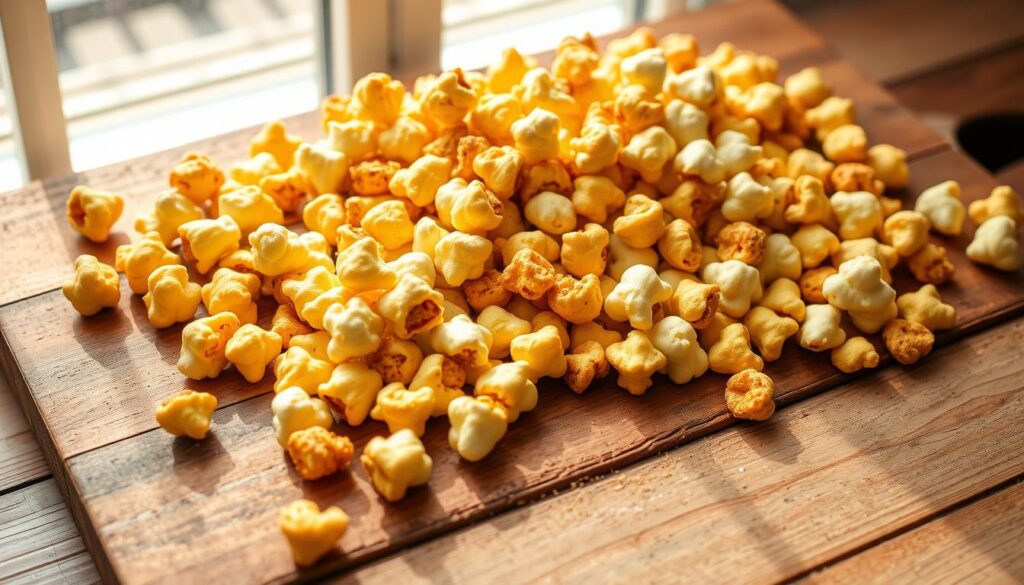Table of Contents
Every dog owner has seen those puppy eyes when they want a snack. Popcorn can be tempting, but not all is safe for dogs. Knowing which popcorn is safe can make sharing a snack a special moment.
We want our pets to be happy and healthy. Plain, air-popped popcorn can be a good treat if done right. The trick is to know how to make it safe for your dog.
This guide will cover everything about dog popcorn treats. We’ll look at the good and bad, and give tips for a safe snack time with your dog.
Key Takeaways
- Plain, air-popped popcorn can be a safe occasional treat for dogs
- Always remove unpopped kernels to prevent choking
- Avoid adding salt, butter, or artificial seasonings
- Popcorn should be a rare treat, not a regular part of a dog’s diet
- Consult with your veterinarian before introducing new treats
Understanding the Basics of Popcorn for Dogs
Plain popcorn can be a fun treat for your dog. It has some good points when given in small amounts.
Dogs can have plain popcorn as a special snack. But, it’s important to know what’s in it. Popped corn has minerals that help keep your dog healthy.
Nutritional Benefits of Plain Popcorn
Plain popcorn is good for dogs in many ways:
- It has minerals like magnesium and zinc
- It’s good for your dog’s digestion
- It’s low in calories if it’s air-popped
- It has some vitamins that dogs need
What Makes Popcorn Safe or Unsafe
Not all popcorn is safe for dogs. How it’s made matters a lot:
- Safe: Air-popped, plain kernels
- Unsafe: Butter-coated, salted, or flavored popcorn
- Don’t give unpopped kernels because they can choke your dog
Portion Control Guidelines
It’s important to give popcorn in small amounts. Vets say it should be a treat, not a meal.
Small dogs should have just a few kernels. Bigger dogs can have a bit more.
Always talk to your vet before giving new treats. Make sure they’re right for your dog’s diet.
The Health Benefits of Air-Popped Popcorn
Air-popped popcorn is a surprising healthy snack for dogs. It can be a great addition to their diet when given in the right way. This light and nutritious treat offers many benefits for your furry friend.
Dogs can enjoy air-popped popcorn as a low-calorie treat. It has some nutritional value. But, it’s important to prepare it without added oils, salt, or seasonings that could harm your pet.
- Low in calories and fat
- Contains essential minerals like magnesium
- Provides small amounts of dietary fiber
- Supports digestive health
“Moderation is crucial when introducing air-popped popcorn for dogs as a healthy snack option.” – Veterinary Nutrition Experts
Nutritional advantages of air-popped popcorn for dogs include minimal caloric impact and potential digestive support. Whole grains like popcorn offer trace amounts of nutrients. These nutrients can help improve your dog’s overall diet.
| Nutrient | Benefit for Dogs |
|---|---|
| Fiber | Supports digestive regularity |
| Magnesium | Supports bone and muscle health |
| Carbohydrates | Provides energy in small amounts |
Remember, air-popped popcorn should always be an occasional treat, not a main food. Healthy dog snacks are best when given sparingly in a balanced diet.
Potential Risks and Hazards to Consider
Popcorn might seem like a harmless snack, but it can be risky for dogs. It’s important for pet owners to know these dangers to keep their dogs safe and healthy.
Popcorn risks for dogs go beyond just eating it. There are several key areas to watch out for to avoid health problems.
Choking and Dental Concerns
Unpopped or partially popped kernels are big choking hazards for dogs. These hard kernels can:
- Get stuck in your dog’s throat
- Cause dental damage
- Create potential blockages in the digestive tract
Digestive Issues and Sensitivities
Some dogs have trouble digesting popcorn. Digestive problems can include:
- Stomach upset
- Potential pancreatitis
- Intestinal discomfort
Dangerous Additives and Ingredients
| Popcorn Additive | Potential Risk to Dogs |
|---|---|
| Butter | High fat content, potential pancreatitis |
| Salt | Sodium toxicity, dehydration |
| Artificial Sweeteners | Toxic compounds, potential organ damage |
Artificial additives can turn a harmless snack into a dangerous one. Always check ingredients carefully before sharing any human food with your dog.
How to Prepare Dog Popcorn Safely

Making safe popcorn for dogs needs careful steps. An air popper is the best choice. It avoids harmful oils or seasonings.
Here are the key steps for dog-friendly popcorn:
- Use a clean air popper just for pet treats
- Pick plain, unseasoned kernels for pets
- Make sure the popcorn is cool before giving it to your dog
- Take out all unpopped kernels to avoid choking
Keeping things clean is very important. Always wash your hands and use clean tools. Keep your dog’s popcorn area separate from where you make food for humans.
| Preparation Step | Safety Consideration |
|---|---|
| Kernel Selection | Choose plain, unflavored kernels |
| Cooking Method | Use air popper only |
| Cooling Process | Let popcorn cool completely |
| Final Check | Remove all unpopped kernels |
Start with small amounts of popcorn to see if your dog likes it. Watch for any signs of digestive discomfort or allergic reactions. Popcorn should be a rare treat, not a regular food.
Pro tip: Talk to your vet before adding new treats to your dog’s diet.
Best Practices for Serving Popcorn to Your Pet
Sharing popcorn with your dog can be fun if done right. Knowing the right amount and how often to give it is key for their health and happiness.
Popcorn can be a tasty, low-calorie snack for dogs if made correctly. Before giving it to them, think about their diet and health.
Proper Serving Sizes
Here are some guidelines for serving sizes:
- Small dogs: 1/4 cup of air-popped popcorn
- Medium dogs: 1/2 to 1 cup of air-popped popcorn
- Large dogs: Up to 1 cup of air-popped popcorn
Frequency of Treats
It’s important to not overdo it with popcorn treats. Experts suggest:
- Give popcorn treats 1-2 times a week
- Treats should not make up more than 10% of their daily calories
- Keep an eye on how your dog reacts
Signs of Adverse Reactions
Be on the lookout for these signs after giving popcorn:
| Reaction Type | Symptoms | Action |
|---|---|---|
| Digestive Upset | Vomiting, Diarrhea | Stop treats, consult veterinarian |
| Allergic Response | Itching, Swelling | Immediate veterinary care |
| Choking Hazard | Coughing, Difficulty Breathing | Emergency veterinary intervention |
“Every dog is unique. Always introduce new treats gradually and observe your pet’s response.” – Veterinary Nutrition Experts
Remember, plain, air-popped popcorn without salt, butter, or additional seasonings is the safest option for your furry friend.
Creative Dog-Safe Popcorn Recipes

Turning plain popcorn into tasty treats for dogs is fun and healthy. These recipes are a great way to reward your pet. They’re a tasty, healthy option instead of regular dog treats.
Before starting, keep these tips in mind:
- Always use plain, air-popped popcorn
- Avoid salt, butter, and artificial seasonings
- Introduce new treats gradually
- Monitor your dog’s reaction
Here are three easy recipes to try:
| Recipe Name | Ingredients | Preparation |
|---|---|---|
| Peanut Butter Popcorn Bites |
| Drizzle melted peanut butter over popcorn, let cool |
| Pumpkin Popcorn Crunch |
| Mix pumpkin lightly with popcorn |
| Chicken Powder Popcorn |
| Sprinkle chicken powder over popcorn |
Pro tip: Always introduce new homemade dog popcorn treats in small quantities to prevent digestive upset.
These recipes offer a fun, healthy snack for your dog. Just remember to keep the portions small. Use them as an occasional treat, not a full meal.
Dangerous Popcorn Toppings to Avoid
When giving popcorn to your dog, knowing what’s safe is key. Not all toppings are good for them. Some can be very harmful.
Some toppings can turn safe popcorn into a bad choice. Dog owners need to watch what they add.
Common Harmful Ingredients
Some ingredients are toxic to dogs. It’s important to choose safe toppings for your pet. Here are some to avoid:
- Salt: Too much can cause dehydration and poisoning
- Artificial Sweeteners: Xylitol is very toxic and can drop blood sugar fast
- Butter and Fatty Seasonings: Can cause pancreatitis
- Garlic and Onion Powders: Harm the digestive system
- Chocolate-based Toppings: Extremely dangerous and can be fatal
Alternative Safe Seasonings
For dog-friendly popcorn, use plain, air-popped kernels. For flavor, try these safe toppings:
- Unsalted, plain turmeric
- Small amounts of dried parsley
- A tiny sprinkle of cinnamon
- Crushed plain pumpkin seeds
Start with small amounts of new foods. Talk to your vet about your dog’s diet and treats.
Commercial Popcorn Products and Your Dog
When looking at store-bought popcorn for dogs, owners need to be very careful. Many commercial dog popcorn treats have hidden ingredients that can harm your pet. These treats might look good but can be bad for your dog’s health.
Not all commercial popcorn products are the same. Some things to think about include:
- Sodium content in store-bought popcorn
- Artificial flavoring and preservatives
- Potential choking hazards
- Nutritional value
Veterinary nutritionists say it’s important to check the labels of commercial dog popcorn treats. Most of these treats have too much salt, butter, or chemicals. These can upset your dog’s stomach.
| Commercial Popcorn Type | Safety Rating | Potential Risks |
|---|---|---|
| Microwave Popcorn | Unsafe | High salt, artificial chemicals |
| Pre-Popped Bagged Popcorn | Low Safety | Added flavors, preservatives |
| Plain Air-Popped Packaged Popcorn | Moderate Safety | Minimal processing risks |
Pro tip: Homemade, plain air-popped popcorn is the safest choice for your dog.
Always talk to your vet before giving your dog new commercial popcorn treats.
Homemade vs. Store-Bought Dog Popcorn Treats
Choosing between homemade dog popcorn treats and store-bought ones can be tough. Each option has its own benefits, fitting different pet care needs and lifestyles.
Homemade treats let you control what goes into them. You can pick:
- No unnecessary additives
- Fresh, high-quality ingredients
- Customized nutritional content
- Tailored portion sizes
Commercial dog popcorn is great for those who are busy. When picking store-bought treats, remember to:
- Check ingredient lists carefully
- Verify nutritional standards
- Research brand reputation
- Confirm veterinarian recommendations
| Aspect | DIY Dog Popcorn Treats | Commercial Dog Popcorn |
|---|---|---|
| Ingredient Control | Full control | Limited control |
| Preparation Time | More time-consuming | Quick and easy |
| Cost | Potentially cheaper | Often more expensive |
| Nutritional Quality | Customizable | Standardized |
Your choice depends on your dog’s needs, your schedule, and what you prefer. Getting advice from a vet can help you choose the best for your dog’s health and happiness.
Alternative Healthy Snacks to Dog Popcorn
Adding new treats to your dog’s diet can be good for their health. It’s a chance to give them tasty, nutritious snacks. This way, your furry friend gets a variety of healthy treats.
There are many dog-friendly fruits and vegetables. These can make your dog happy and healthy.
Fresh Fruit Delights
Fruits can be great treats for dogs if given in small amounts. Here are some good choices:
- Apples (without seeds)
- Blueberries
- Watermelon (seedless)
- Strawberries
Vegetable Alternatives
Vegetables are crunchy and full of nutrients. They make great snacks for dogs. Here are some good options:
- Carrots
- Green beans
- Cucumber slices
- Pumpkin (cooked)
Commercial Treat Recommendations
For easy options, many commercial treats are available. Look for ones made for dogs. They should have:
- Natural ingredients
- Low-calorie options
- Veterinarian-approved formulations
Pro tip: Always check with your vet before trying new treats. This ensures they’re right for your dog’s diet.
Conclusion
Sharing snacks with your furry friend can be fun if you do it right. Knowing the safe dog popcorn guidelines helps your pup enjoy treats without health risks. Plain, air-popped popcorn is a good choice if given in small amounts.
Your dog’s health is key, and choosing the right treats is important. Vets say to be careful with new snacks and always think about your pet’s diet. Always check with your vet before giving popcorn to make sure it’s safe for your dog.
Treats should not replace a balanced diet. Popcorn can be a fun treat sometimes, but it shouldn’t be a big part of their food. By paying attention to what you give them, you can make sure they stay healthy and happy.
Being a pet owner means caring for your pet’s special needs. Treat time should be filled with knowledge, patience, and love. Your dog will thank you for taking care of their health and happiness.
There are no reviews yet. Be the first one to write one.

